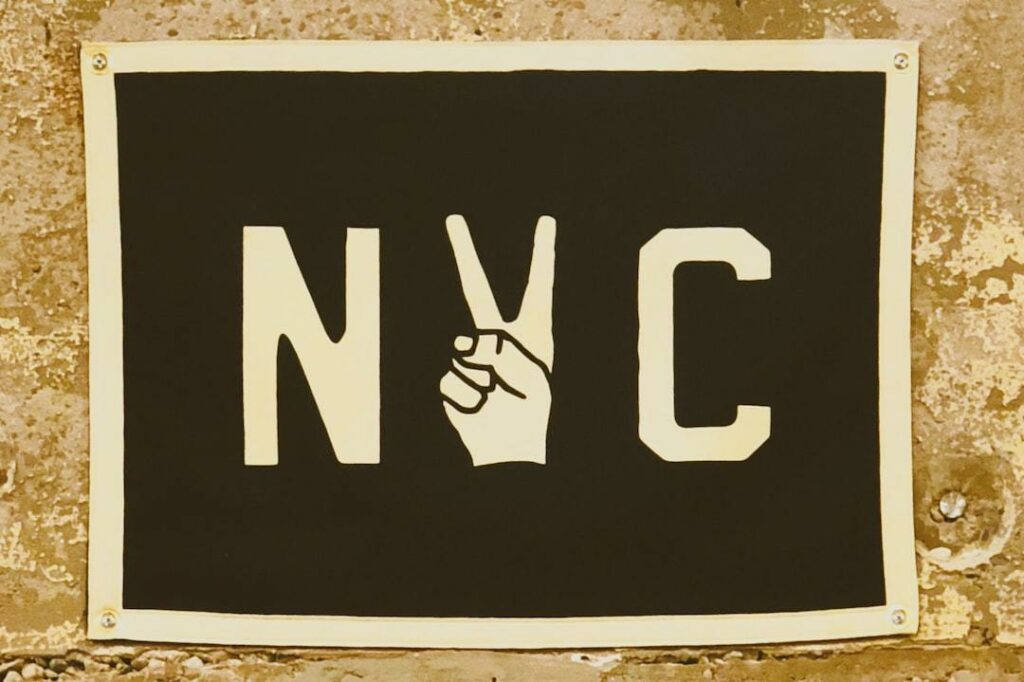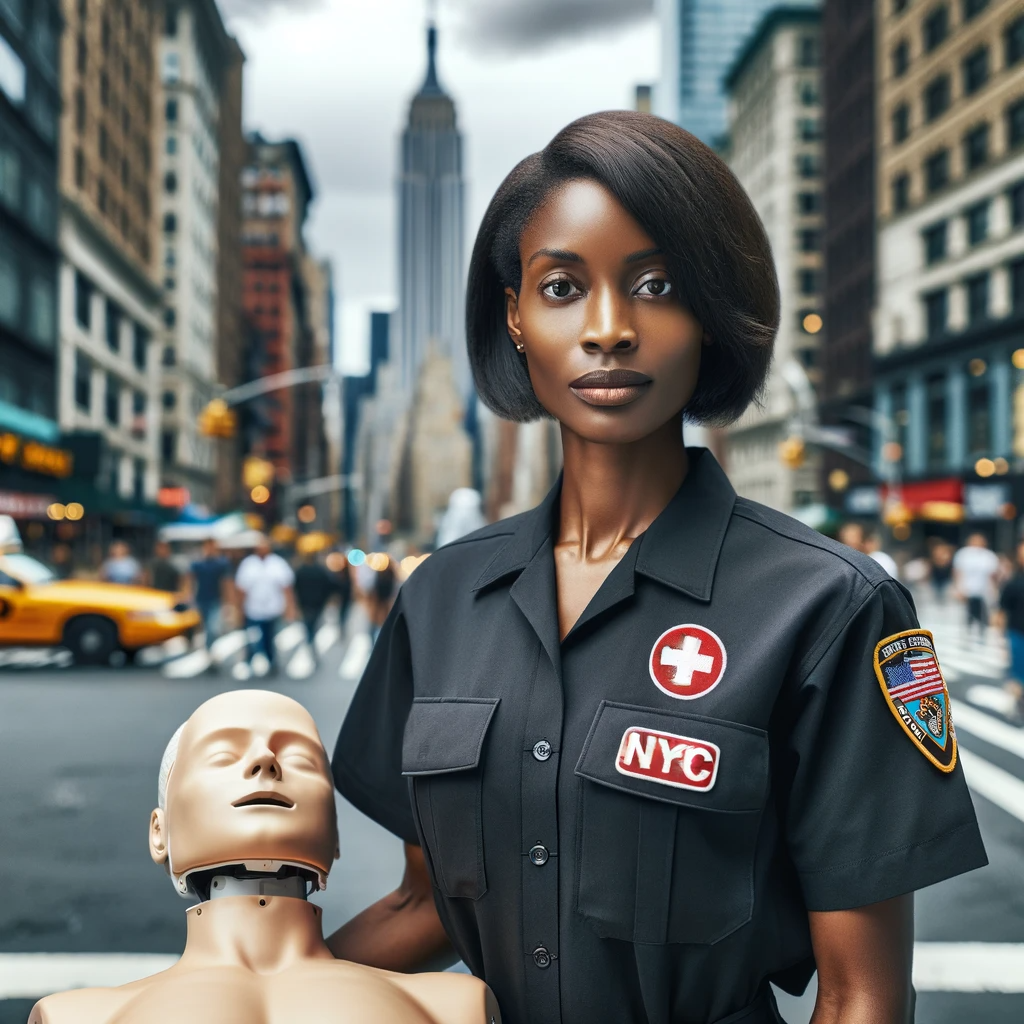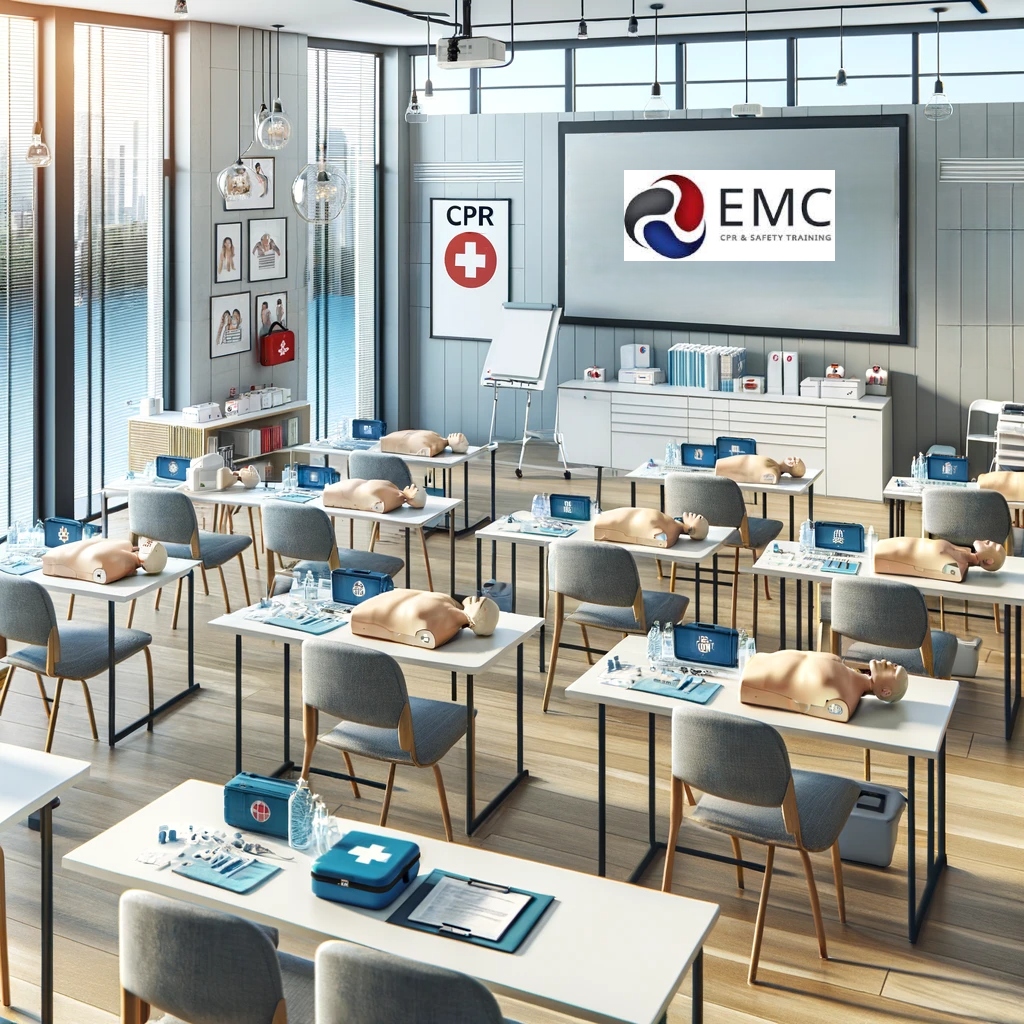
Get CPR training for your team!
If you have any questions feel free to email us at info@emccprtraining.com
CONTACT ONE OF OUR EXPERTS HERE

Last Updated on January 28, 2024 by CPR Training
Picture this: you’re strolling through New York City’s vibrant streets when a passerby suddenly collapses. Panic ensues. But wait, you’ve got it covered because you participated in CPR classes NYC.
Knowing how to perform CPR can make all the difference between life and death during those critical moments before professional help arrives. Plus, having this skill under your belt can open up job opportunities or even give you peace of mind, knowing that if something happens, you’re prepared.
This post will explore everything for busy New Yorkers, including cost considerations and certification.
New York City, bustling with life and activity, also brings unexpected emergencies. Being trained in Cardiopulmonary Resuscitation (CPR) is a skill that can save lives during these critical moments. This guide will give you an overview of the different types of CPR classes NYC.
In NYC, various institutions offer diverse CPR AED classes. The American Heart Association (AHA), American Red Cross (ARC), and Health & Safety Institute (HSI) all have comprehensive programs designed for different needs. These range from basic training for individuals wanting personal preparedness to more advanced courses tailored toward healthcare provider CPR.
The right CPR program depends on your individual needs and professional requirements. Some people might need basic first aid certification, while others may need more specialized training such as BLS Healthcare (BLS), Pediatric Advanced Life Support (PALS), or Advanced Cardiovascular Life Support (ACLS). Make sure to choose a course that suits your specific goals.
CPR classes vary greatly in cost based on their depth and duration, but NYC has affordable options, too. Many providers offer discounts for group bookings, which makes workplace-based sessions financially attractive.
Once the initial course is completed, CPR/AED certification is typically valid for two years before renewal classes are required to maintain it. After this period, renewal classes are needed to keep the certification card active. Institutions like EMC CPR & Safety Training offer initial certification and renewal CPR classes NYC.
It’s all about becoming proficient. It requires determination and commitment, but the payoff is well worth it.
NYC is a hotspot for diverse CPR classes from institutions like the American Heart Association, Red Cross, and Health & Safety Institute. Choose your class based on personal or professional needs, from basic first aid to advanced support training. After completing your training, you’ll receive a valid certification for two years.
If you’re a NYC resident seeking flexibility and convenience to learn life-saving skills, online CPR classes might be the perfect fit. These platforms offer comprehensive training that’s accessible from anywhere.
The American Red Cross (ARC), a leading first aid and emergency response training authority, offers robust online courses. Their curriculum includes theoretical knowledge and practical scenarios to ensure trainees are well-equipped for real-life emergencies.
The American Heart Association (AHA), another trusted name, provides detailed CPR/AED/First Aid courses suitable for healthcare professionals or anyone looking to enhance their emergency response capabilities. The AHA’s blended learning program combines self-paced eLearning with hands-on classroom setting sessions under an experienced instructor’s supervision.
Apart from ARC and AHA, the Health & Safety Institute (HSI) also stands out when providing high-quality online and classroom education on critical lifesaving techniques such as CPR/AED/First Aid. HSI offers nationally recognized certification that is valid across all states, including New York City.
Last but not least, at EMC, we pride ourselves in offering top-notch digital instruction through our virtual classroom, where learners get direct interaction with seasoned trainers, ensuring an enriched learning experience right from home. Check out our extensive range of course offerings on EMC’s website.
CPR classes in New York City vary widely when it comes to cost. This is primarily due to the different course structures, certification bodies like the American Heart Association (AHA), American Red Cross (ARC), and Health & Safety Institute (HSI), as well as training locations.
A standard adult CPR/AED class from AHA or ARC can range between $70 and $90. Expect to pay around $110-$130 for a more extensive class, including First Aid. HSI courses tend to be slightly cheaper but are equally recognized and respected.
The abovementioned costs include all the necessary materials, such as textbooks, pocket masks, and keychain barriers.
If you decide on online classes, which have become increasingly popular lately due to their flexibility, especially among busy NYC residents – pricing becomes even more varied depending on your chosen platform’s reputation and course content quality. But bear in mind learning CPR in a traditional classroom format allows CPR practice in a dummy, reinforcing the skills learned.
Remember that most certifications need renewal every two years, so consider this when budgeting for your long-term training needs. Some providers offer discounts for returning students, making recertification less costly.
Rapid and accurate action can distinguish between life and death in an emergency. Offering CPR/AED classes onsite for employees equips them with the skills to respond effectively in these critical moments.
CPR training within your workplace doesn’t just save lives; it builds a sense of community among employees. They learn together to support each other during training sessions, creating bonds that go beyond work responsibilities.
Including a First Aid class and possibly Bloodborne Pathogens in the offering will help you feel more confident to respond to various medical emergencies.All training offered meets OSHA requirements.
American Heart Association (AHA), one of our main program providers, emphasizes the need for immediate bystander CPR intervention before medical help arrives, as this increases survival rates drastically in cardiac arrest emergency cases.
AED devices are also crucial components in saving lives during cardiac emergencies. Our sales and program management covers all major AED brands, ensuring you get comprehensive equipment coverage alongside top-tier instruction from certified trainers.
Taking time off work to attend external courses may be inconvenient for some staff members, but having an onsite course eliminates such hurdles, promoting more participation and better emergency preparedness levels across the board. This not only makes learning more accessible but also encourages continued practice, which reinforces what has been learned, making sure it sticks when needed most.
We emphasize practical application during our training sessions, giving trainees firsthand experience handling real-life situations correctly through various drills, including choking incidents or severe bleeding control. Training under professional guidance gives confidence when dealing with high-pressure scenarios, knowing they have the skills to save a life potentially. It’s not just about certification; it’s empowering your staff with lifesaving knowledge and skills.
Onsite CPR classes empower employees with critical life-saving skills and foster a sense of community at work. American Heart Association emphasizes immediate bystander intervention, highlighting the importance of these training sessions.
In-house courses also promote participation by eliminating time-off needs for external classes. It’s not just about getting certified – it’s about gaining confidence to handle high-pressure situations effectively.

Getting certified in Cardiopulmonary Resuscitation (CPR) in New York City involves several key steps. Understanding when and how to use the techniques effectively is essential for successful CPR certification in NYC.
Your first task is to select a reputable training provider. Renowned organizations like the American Red Cross (ARC), American Heart Association (AHA), or Health & Safety Institute offer comprehensive courses that meet all requirements for certification.
Once you have identified your needs, select the course that best meets them. Some people might opt for basic CPR classes, while others prefer more advanced ones, including Automated External Defibrillator (AED) usage and First Aid training. Healthcare Providers will often opt for BLS CPR (Basic Life Support).
Courses usually comprise theoretical lessons and practical sessions where you can practice life-saving skills under professional supervision. You’ll get hands-on experience on dummies simulating real-life situations, which will help build confidence.
To become certified, passing a skills examination is mandatory after completing your layperson training.
Written exams are also required for a BLS provider certification. These exams test your theoretical knowledge and practical skills to ensure you’re ready to handle emergencies professionally. Upon successful completion, all certification cards are valid for two years.
All these stages are crucial as they ensure you gain valuable lifesaving skills – this isn’t something one can take lightly.

Staying on top of your CPR and AED certification is paramount in the hustle and bustle of NYC, as it not only keeps you prepared to help save lives but also hones in your skills. Maintaining your CPR qualifications isn’t just about honing your skills; it’s also essential for being prepared to provide vital aid when required.
CPR certifications from recognized organizations like the American Red Cross, American Heart Association (AHA), and Health & Safety Institute (HSI) generally need renewal every two years. How can one go about renewing their CPR certification?
The first step is identifying a reputable provider offering recertification classes in NYC. A simple search can yield numerous options, including onsite group training classes or online courses if that’s more convenient.
Note: Online platforms offer flexible schedules, which could be beneficial given the hectic lifestyle many New Yorkers lead.
To renew your certificate, sign up with an authorized training center where instructors will refresh critical procedures like chest compressions and rescue breaths.
This practical review is essential because guidelines may have changed since your last certification – advancements in medical research often influence these protocols.
The usefulness of CPR training is beyond measure. In New York City, a bustling metropolis teeming with life, the skills learned from CPR classes have immense real-world applications.
This knowledge can make the difference between life and death in everyday situations. Imagine you’re enjoying a day at Central Park when someone nearby collapses from a heart attack. With your CPR certification gained through programs such as those offered by the American Heart Association or Red Cross, you can help until professional medical assistance arrives.
Beyond personal circumstances, workplaces also benefit greatly from having staff trained in first aid procedures like CPR. Industries from construction sites to corporate offices can experience emergencies requiring immediate response.
Sudden cardiac arrest (SCA), for instance, is one health emergency that requires swift action, which often isn’t possible waiting for paramedics. A study by NYU Langone Health, highlights how quick intervention using an automated external defibrillator (AED) drastically improves survival rates during SCA events – up to 50% if given within five minutes.
Onsite group training helps employees know what actions must be taken during emergencies while fostering teamwork and communication abilities essential for effective crisis management.
Firms like EMC provide comprehensive onsite group training covering all major AED brands available today.
This makes it easier than ever before for organizations across NYC to get their teams the lifesaving skills they need.
In conclusion, CPR training offers invaluable benefits in personal or professional settings. By learning these vital techniques, New Yorkers can save lives and contribute to creating safer communities and workplaces.
CPR training in NYC is more than just a course – it’s the key to saving lives at home and work. From Central Park outings to corporate emergencies, your CPR skills can make all the difference. And with onsite group training from firms like EMC, learning lifesaving techniques has never been easier or more essential for New Yorkers.
As the world becomes more health-conscious, workplace safety training is gaining prominence. This trend underscores the importance of working with a trusted partner like EMC CPR & Safety Training.
We offer top-notch onsite group training programs that comply with standards set by major organizations such as the American Heart Association (AHA), American Red Cross (ARC), and Health & Safety Institute (HSI).
Beyond teaching life-saving skills, we give your workplace access to quality Automated External Defibrillators (AEDs). We manage AED programs for all major brands, ensuring you get not just any device but one tailored to meet your needs.
The convenience doesn’t stop there; our team also helps maintain these devices to remain functional when needed.
We understand how busy work schedules can be. That’s why we have flexible learning options for NYC businesses of all sizes. Whether it’s an online or an on-site training class at your location, we make getting trained easier.
Your employees will appreciate this thoughtful gesture as it shows concern about their well-being within and outside the workplace.
To snag your CPR certification in NYC, you must pick a course, complete the training, and ace the final test.
Certainly, some local fire departments offer free CPR training NYC. Most of the time, these do not include a CPR AED certification. Check their websites for details.
Your typical run-of-the-mill CPR card stays valid for two years after it’s issued. After that, you’ve gotta renew it.
The American Heart Association CPR (AHA) and Red Cross both dish out reputable certifications. Pick one based on convenience and personal preference.
Getting CPR certified in NYC isn’t just a line on your resume. It’s an aptitude that can rescue lives.
CPR classes NYC is varied, fitting every budget and schedule. Whether online or onsite, there’s an option for you.
The cost? It is well worth considering the benefits of being prepared during life-threatening situations, which saves lives.
Remember: Certification doesn’t last forever! Keep yours current to ensure you’re always ready to lend a hand when needed.
CPR training isn’t confined to medical professionals – everyone can use these skills at work or in their daily lives!
In short, whether through EMC Safety Training or other providers, getting CPR trained equips you with the lifesaving skills needed while opening up job opportunities. So why wait? Start your journey today!
Work with EMC to feel confident in a cardiac emergency with CPR NYC, CPR certification Long Island, or CPR classes Dutchess County NY.
Check out our other blogs at https://www.emccprtraining.com/blog/.
Contact us at www.emccprtraining.com/contact or 800-695-5655 to learn about our onsite CPR/AED training and AED sales.
Get CPR training for your team!
If you have any questions feel free to email us at info@emccprtraining.com
CONTACT ONE OF OUR EXPERTS HERE